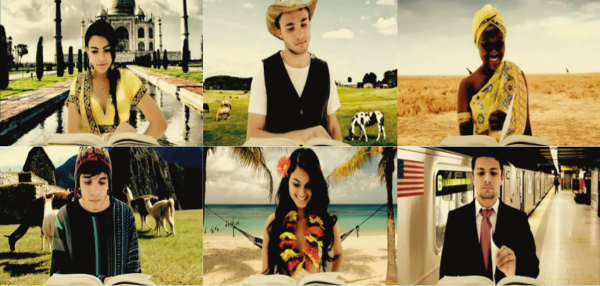 Generally, sharing is an instantaneous act of contact and when not physical then at least virtual. To this end, ‘‘BookCrossing’’ takes on the characteristics of both sharing and of playing. In reality, this is a form of sharing but it does also involve, to a large extent, the factor of surprise with this sensual component simultaneously recalling the universe of games. In sum, ‘‘BookCrossing’’ in practice involves the act of leaving a book in a public place so that somebody else may pick it up, read it and then hand it back to the world again. Because this world is the place of ideas and books are no more than one of the best means we have available of materialising those ideas. In truth, this also to a certain extent constitutes the objective of those engaging in these practices: transforming the entire world into a library.
Generally, sharing is an instantaneous act of contact and when not physical then at least virtual. To this end, ‘‘BookCrossing’’ takes on the characteristics of both sharing and of playing. In reality, this is a form of sharing but it does also involve, to a large extent, the factor of surprise with this sensual component simultaneously recalling the universe of games. In sum, ‘‘BookCrossing’’ in practice involves the act of leaving a book in a public place so that somebody else may pick it up, read it and then hand it back to the world again. Because this world is the place of ideas and books are no more than one of the best means we have available of materialising those ideas. In truth, this also to a certain extent constitutes the objective of those engaging in these practices: transforming the entire world into a library.
Idealised by Ron Hornbaker(1), ‘BookCrossing’ swiftly spread from idea to a practice in effect on a global scale with countries such as Singapore considered as among the movement’s hotspots. Finding books through ‘BookCrossing’ may as much be by mere chance in public locations such as cafés, libraries, restaurants or public transport as well as in places previously defined for this purpose, themselves denominated ‘crossing points’.

However, the books are not the only form of sharing provided by ‘BookCrossing’ given that its members frequently attend ‘BookCrossing’ forums and thus engage personally in speaking and discussing books in general or a particular book read by members of the same circle of readers. The reader circles constitute chains down which books are successively passed between various persons and that end in the exchange of opinions and experiences about the respective book and its themes.
In Portugal, ‘BookCrossing’ was instantaneously taken up by various participants that give life to the Portuguese forum of this movement. Margarida Pires and Maria Nunes are two typical participants in ‘BookCrossing’ in Portugal. In a similar fashion, Ana Saragoça signed up to this form of sharing books some eleven years ago and has since clocked up over 2,300 books received and released with everything suggesting this is set to last.
This adhesion reflects in the statistics kept by ‘BookCrossing’ given that while only 3% of Portuguese residents participate, that still gets the country into the ‘Top 10’ of participants by percentage and ahead of Spain even while substantially behind the United States where 29% of people take part.
The first Portuguese book sharing event dates back to the Lisbon of 20th November 2002 and with cities as diverse as Porto, Almada, Coimbra and Braga having since also hosted meetings.
Indeed, in Portugal, it is already difficult to find a city without some point for exchanging books. In Lisbon we have the bar-restaurant Agito in Bairro Alto while in the neighbouring council of Oeiras, any one of the three libraries has a box full of books for this type of sharing. In São João da Madeira, we may find a ‘BookCrossing’ point in the bookstore Taccuino and the same is true of Quasiloja in Porto.
As Miguel de Cervantes stated: “Whoever reads a lot and walks a lot, will go far and know much.”
 Eco123 Revista da Economia e Ecologia
Eco123 Revista da Economia e Ecologia



